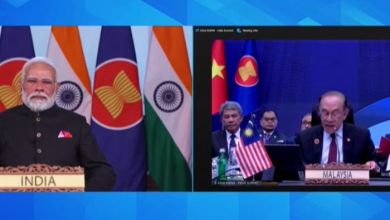Xi Jinping Pledges Infrastructure Support to Transform Nepal into a Land-Linked Nation
The trans-Himalayan connectivity projects encompass road and rail networks traversing the challenging Himalayan terrain, connecting Nepal with Tibet.

Hangzhou, China: Chinese President Xi Jinping has expressed China’s commitment to assisting Nepal in its journey from being a landlocked country to becoming a land-linked nation by enhancing infrastructure connectivity and transit transportation cooperation. President Xi made this assurance during his meeting with Nepali Prime Minister Pushpa Kamal Dahal ‘Prachanda’ on the sidelines of the Hangzhou Asian Games in eastern China.
Prime Minister Prachanda, who distanced himself politically from the pro-China Communist Party of Nepal (Unified Marxist-Leninist) led by KP Oli after assuming office as Prime Minister in December last year, embarked on his first official visit to China after visiting India and the United States.
During the meeting, President Xi, who had previously made a significant visit to Nepal in 2019, highlighted the progress made in the ‘Trans-Himalayan Multi-Dimensional Connectivity Network’ and other ‘Belt and Road’ initiatives between the two nations, particularly through Tibet.
He called upon both countries to collaborate further in promoting infrastructure connectivity and expanding transit transportation cooperation. The ultimate goal is to assist Nepal in its transition from being landlocked to becoming a land-linked country at an early date.
The trans-Himalayan connectivity projects encompass road and rail networks traversing the challenging Himalayan terrain, connecting Nepal with Tibet. These initiatives aim to reduce Nepal’s dependency on India for imports, aligning with China’s efforts to extend its influence in the region.
However, it’s worth noting that several Chinese projects in Nepal, including border infrastructure, have encountered delays, partly due to the COVID-19 pandemic, during which China temporarily closed its borders.
Nepal has previously signed a transport-transit agreement with China, granting it access to seven ports in the country. Additionally, nine Belt and Road Initiative (BRI) projects have been selected for implementation, and the concept of the “Trans-Himalayan Multi-Dimensional Connectivity Network” has been introduced, fostering cross-border cooperation.
Nevertheless, it is essential to address the implementation challenges of these agreements. “When Chinese President Xi Jinping visited Nepal in 2019, the two countries signed seven bilateral agreements, but most were not implemented,” noted Pragya Ghimire of the Institute of Foreign Affairs, Nepal.
During their meeting, President Xi emphasized the need for mutual understanding and support on issues related to each other’s core interests and major concerns to strengthen the political foundation of bilateral relations.
Prime Minister Prachanda expressed his admiration for President Xi as a visionary global leader and a friend of the Nepalese people. He reiterated Nepal’s commitment to the one-China policy, pledging not to allow any force to use its territory to undermine China’s sovereignty and security. Prachanda also expressed Nepal’s appreciation for the Belt and Road Initiative and its intention to actively participate in Belt and Road cooperation while supporting the construction of the Trans-Himalayan Multi-Dimensional Connectivity Network.
Both nations were expected to sign multiple agreements aimed at bolstering Chinese investments in Nepal, as reported by Nepalese media.




